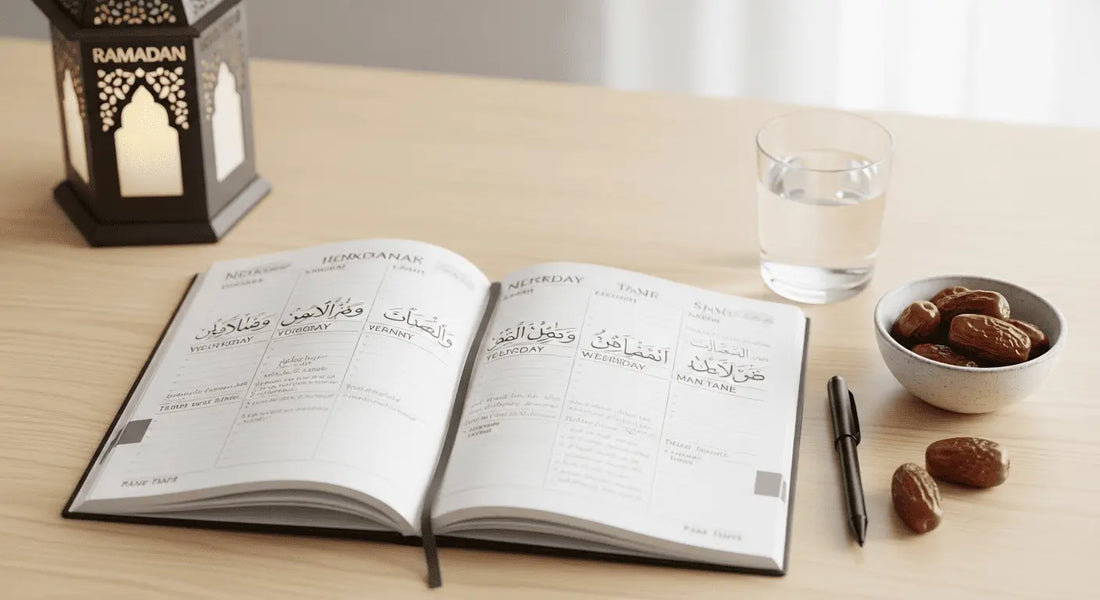
How to Plan a Productive Ramadan
Share
Introduction
Ramadan is more than just fasting—it’s a month of discipline, reflection, and maximizing barakah. Yet, many Muslims struggle to balance their ibadah with work, family, and personal commitments. That’s where a Ramadan planner comes in. By organizing your time with clear goals, routines, and reflections, you can make the most of every day in this blessed month.
And the best part? We’ve included a free Ramadan checklist in this article to help you stay consistent and focused.
Why Planning for Ramadan Matters
Fasting from dawn to sunset takes physical and mental energy. Without proper planning, days can slip by with missed opportunities for Qur’an, salah, or community service. A Ramadan planner helps you stay intentional and avoid burnout.
The Spiritual Purpose of Planning
Planning in Islam isn’t about control—it’s about aligning your daily life with your intentions. Prophet Muhammad ﷺ said, “Actions are judged by intentions.” A planner allows you to write down your ibadah goals, making them more focused and achievable.
Balancing Worship and Daily Duties
Ramadan doesn’t pause your work, studies, or family responsibilities. By scheduling around salah, meal times, and personal commitments, you ensure harmony between your spiritual and worldly obligations.
Setting Your Ramadan Goals
Before Ramadan begins, set clear goals in three areas:

Worship Goals (Qur’an, Salah, the )
- Decide how many pages or surahs of the Qur’an you want to complete daily.
- Track obligatory prayers and add Sunnah and Taraweeh.
-
Write down duas you want to focus on.
Productivity Goals (Work, Study, Family)
-
Plan work/study sessions during peak energy hours (e.g., after Suhoor or post-Dhuhr nap).
- Assign family activities like shared Qur’an reading or charity work.
Health & Wellness Goals (Sleep, Nutrition, Fitness)
- Ensure consistent sleep cycles with planned naps.
- Prep Suhoor and Iftar meals ahead to save time.
-
Incorporate light workouts to stay energized.
Using a Ramadan Planner Effectively
A Ramadan planner is more than a notebook—it’s your accountability partner throughout the month.
Daily Routines for Ramadan
Plan your mornings after Suhoor for Qur’an and Fajr reflection. Reserve afternoons for focused work or rest. Evenings should be family and ibadah-centered.
Time Blocking for Worship & Work
Assign time slots for Qur’an, Salah, work, family, and sleep. This reduces decision fatigue and keeps you on track.
Tracking Habits with a Planner
Use a daily tracker for salah, adhkar, charity, and Qur’an recitation. Visual progress motivates consistency.
The Ultimate Ramadan Checklist (Free Download)
Here’s your free Ramadan checklist to help you stay consistent and organized:
- Daily Salah on time
- Read Qur’an (x pages daily)
- Dhikr & Duas after each prayer
- Meal prep for Suhoor & Iftar
- Charity (daily/weekly)
- Taraweeh attendance or at-home prayer
- Journaling reflections
(Tip: Offer this as a downloadable PDF on your site for added value.)
Practical Tips for a Productive Ramadan
Meal Planning & Energy Management
Prep meals in advance to avoid kitchen stress. Focus on light, nutritious foods to maintain energy.

Reducing Distractions
Limit social media and avoid unnecessary outings. Protect your mental focus for worship and reflection.
Creating a Family Ramadan Schedule
Include your spouse and kids in meal prep, Qur’an reading, or charity drives. Shared activities strengthen family bonds.
Balancing Worship and Work During Ramadan
For professionals, students, and moms, balancing responsibilities can be overwhelming. A planner helps you manage both ibadah and dunya without guilt.
Sample Daily Routine Using a Ramadan Planner:
- Suhoor + Fajr: Qur’an reading & reflection
- Morning: Work/study tasks (high-energy hours)
- Dhuhr – Asr: Focused work & planned breaks
- Maghrib: Iftar & family bonding
- Isha – Night: Taraweeh, journaling, and rest
Common Planning Mistakes to Avoid in Ramadan
- Overloading your schedule: Writing down unrealistic Qur’an or ibadah goals.
- Neglecting rest: Poor sleep reduces productivity and worship quality.
-
Forgetting family & community: Ramadan is also about serving others and strengthening ties.

Conclusion: Make Ramadan Count with a Ramadan Planner
A Ramadan planner helps you transform fasting days into purposeful, barakah-filled experiences. By organizing worship, family time, and daily duties, you avoid wasted time and maximize spiritual growth.
Download your free Ramadan checklist today and start planning with intention. For long-term results, explore our Muslim Planner collection to stay productive year-round.
FAQs About Ramadan Planning
1. What is the best way to stay productive in Ramadan?
Plan your day around Salah, block time for Qur’an, and reduce distractions. A Ramadan planner keeps you consistent.
2. Should I use a Ramadan planner or a regular planner?
A Ramadan planner is better—it integrates ibadah, Qur’an, and Sunnah habits that regular planners lack.
3. How do I balance ibadah and work during Ramadan?
Use time-blocking: schedule work during high-energy hours and ibadah around Salah and family time.


